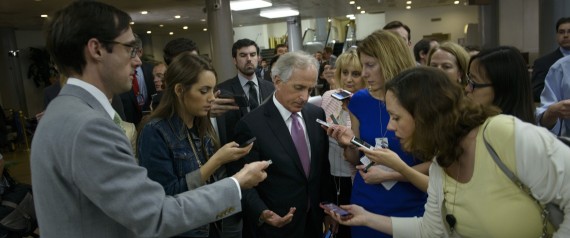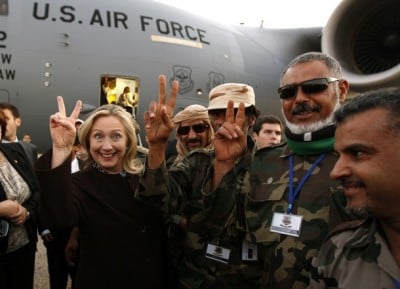
WASHINGTON -- After several months of wrangling between the White House and Senate Foreign Relations Committee Chairman Bob Corker (R-Tenn.), a controversial bill to increase Congress’ involvement in the Iran nuclear talks passed the committee Tuesday on a unanimous vote of 19-0. In a dramatic change from its stance only hours before the vote, the White House indicated that the president would not veto the legislation.
The bill’s apparent success is the result of last-minute negotiated changes to the text, which were hammered out by Corker and the committee's new ranking member, Sen. Ben Cardin (D-Md.), on Monday night into Tuesday morning.
According to Corker, the revised text was posted just minutes before the committee markup, which had been postponed 30 minutes to allow for last-minute discussions.
In its post-markup form, the legislation still requires the president to submit for congressional review the final nuclear agreement reached between Iran, the U.S. and its five negotiating partners. The bill also maintains the prohibition on the president's waiving congressionally enacted sanctions against Iran during the review period.
However, the review period in the measure has been shortened from 60 days to an initial 30 days. If, at the end of the 30 days, Congress were to pass a bill on sanctions relief and send it to the president, an additional 12 days would be automatically added to the review period. This could be another 10 days of review if the president vetoed the resulting sanctions bill.
The international nuclear negotiators currently face a deadline of June 30 to reach a final agreement. Under the new bill, the congressional review period would automatically return to 60 days if the negotiators ran late and concluded an agreement after June 9.
One of the key results of Corker and Cardin's efforts was the abandonment of a clause that would have required the White House to certify to Congress that Iran was not supporting terror in order to provide sanctions relief. The White House viewed requirements that were not specifically related to Iran’s nuclear program as a deliberate poison pill, and it lobbied hard to get the clause scrapped. While the president must still provide a series of reports to Congress detailing Iran’s support for terror globally, that would no longer be tied to implementation of aspects of the nuclear agreement.
Removal of the certification clause was a major requirement for Democrats, although Republicans accepted it grudgingly. During the committee markup, Sen. John Barrasso (R-Wyo.) reintroduced the terrorism certification language as his own amendment to the modified bill.
Corker indicated that he would not support the amendment, making it impossible for it to pass along a party-line vote. After the markup, Corker and Cardin told reporters that Barrasso's move had been planned, with Barrasso aware that his amendment would not be allowed to pass.
“We all knew in advance that that was going to happen,” said Corker, who has been supportive of the terrorism reporting requirement. “We felt like that was a way for our members to express themselves appropriately."
Corker did, however, convince other members of his party to hold off on presenting amendments that would have almost certainly removed Democratic support for the bill.
Sen. Marco Rubio (R-Fla.), who planned to introduce an amendment that would have required the president to certify to Congress that Iran recognizes the state of Israel, settled for language asserting that the nuclear agreement would not compromise U.S. support for Israel’s right to exist.
Similarly, Sen. Ron Johnson (R-Wis.) agreed to hold off on his proposed amendment to treat any nuclear agreement with Iran as a treaty, which would require a two-thirds vote of approval from the Senate before it could be implemented.
Johnson made his disappointment with his party’s concessions clear. “It is a very limited role, it is a role with very little teeth,” he said of the modified oversight bill. “It is a far cry from advice and consent.”
Sen. Johnny Isakson (R-Ga.), at the request of Corker, agreed to withdraw an amendment to provide compensation for American victims of the 1979 Iran hostage crisis from fees collected for violations of Iran sanctions.
While some Republicans were disappointed with the watered-down bill, Democrats on the committee were resoundingly impressed with the outcome of Tuesday’s markup.
“I believe this bill has been changed from a point in which I do not support it to a point in which I can,” said Sen. Barbara Boxer (D-Calif.), who was one of the most steadfast opponents to the original bill. In the days before the markup, Boxer filed 18 amendments to the legislation. One of her amendments proposed striking the entire text of the Corker bill and replacing it with her own Iran oversight act.
“I believe the former bill would have disrupted and upended the ongoing negotiations between Iran and the P5+1. I believe that this bill will not do this,” Boxer said, voicing her support for the new text.
The unanimous bipartisan support for the legislation came as a surprise even to Cardin, who was constantly in touch with other committee Democrats in the days leading up to the vote. “No, I did not expect a 19-0 vote. I feel thrilled by that,” he told reporters.
“I think that really reflects the fact that we really did it right on the manager’s package,” Cardin continued, referring to the deal struck between him and Corker.
Perhaps more surprising than the unanimous vote was the White House’s apparent approval of the modified bill.
"The president would be willing to sign the proposed compromise that is working its way through the committee today," White House press secretary Josh Earnest said during Tuesday’s press briefing, just before the vote.
According to Corker, Secretary of State John Kerry had pushed back against the legislation as late as 11:30 a.m. Tuesday, when he presented a classified briefing on the Iran nuclear talks to members of the Senate.
Even Senate Democrats who were in contact with the White House over the upcoming committee vote seemed unaware that the Obama administration was prepared to drop its strong opposition to the bill.
“It is my hope that with the amendment and markup process today, they will reconsider, but I have no clear expectation of that,” Sen. Chris Coons (D-Del.) told reporters Tuesday morning. “No one has said to me, we won’t veto this if we get this, this and this. That’s not a conversation I’ve had.”
Coons was one of several Democrats who favored congressional oversight of the Iran deal but was hesitant to vote for the original bill. Tuesday’s modifications included language similar to amendments he had proposed last week.
With Obama evidently withdrawing his opposition, Corker's bill is almost certain to become law. Several Republicans took the White House’s reversal as recognition of the weakness of its stance.
“The White House came to the deal when they saw the numbers of people, the growing support that was here,” Corker said.
Cardin, who has been in close contact with the White House over the past 10 days, declined to comment on Corker’s assertion. “I was always trying to get them to the position where they would feel comfortable and allow this bill to go forward. That was my goal from day one,” he said.
To House Minority Leader Nancy Pelosi (D-Calif.), it was the Senate Republicans, not the White House, who capitulated under pressure. “We told the Senate this is going nowhere, that we are going to sustain the president's veto,” she said on Tuesday. “I don't know if that had an impact on what the Senate had to do. But they certainly produced a bill that would be more palatable to our members.”

